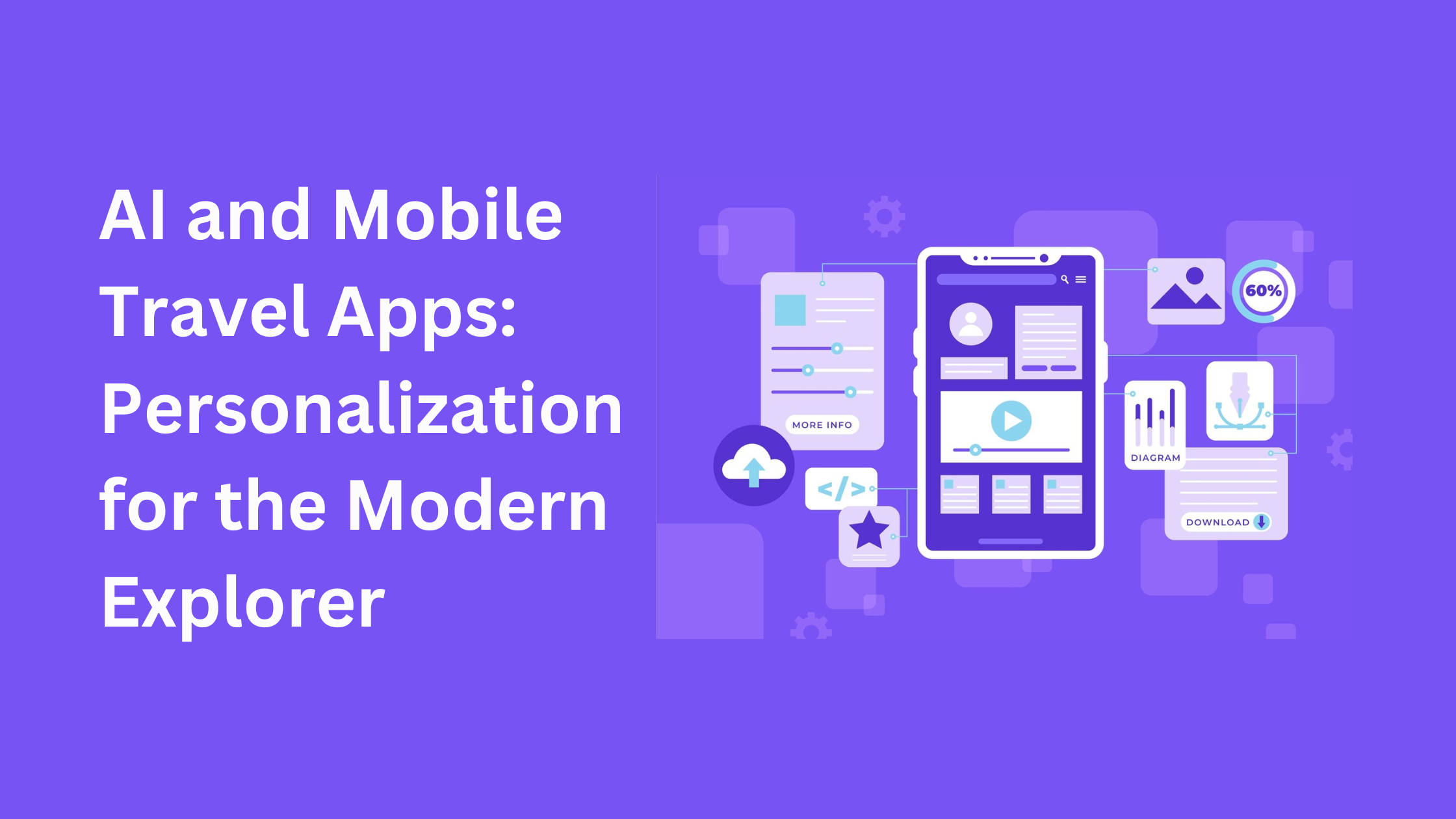
A New Kind of Journey: From Tourist to Algorithmic Nomad
Let’s be honest—travel isn’t what it used to be. Not long ago, planning a trip meant paper maps, overstuffed guidebooks, and hotel confirmation emails buried in inboxes. Fast forward to now, and we’ve got AI whispering suggestions into our smartphones: “Avoid that museum today—it’s crowded. The local art gallery around the corner is quieter, and you might love it based on your recent interests.”
That’s not just convenience. That’s personalization. It’s you, curated in real-time by an algorithm that learns and adapts with every swipe, tap, and ticket.
And the engine behind this shift? Artificial Intelligence, fused into mobile travel apps that aren’t just tools anymore—they’re companions. Intuitive, responsive, and surprisingly aware. Whether you’re backpacking through South America or navigating a business trip to Singapore, today’s mobile travel apps powered by AI are building experiences that feel custom-designed.
Let’s explore how AI is quietly (and powerfully) redefining modern travel.
How Travel Got Smart: AI Behind the Curtain
You may not realize it, but every time your travel app nudges you with “best time to book” alerts or suggests a five-star ramen joint two blocks away, it’s crunching a lot of data.
Artificial intelligence in travel apps works behind the scenes using a mix of machine learning, natural language processing (NLP), and real-time data analytics. What it’s really doing is identifying patterns—when people book flights, which hotels get good reviews, what activities spike on weekends—and then tailoring suggestions based on you.
The result? Experiences that feel serendipitous but are anything but random.
AI can:
-
Learn from your past travel behavior.
-
Understand contextual cues like time of day, weather, or local events.
-
Cross-reference global databases for flights, accommodations, and safety updates.
-
Personalize itineraries, even suggesting “buffer” time if you typically run late.
The power isn’t in giving you more options—it’s about giving you the right ones.
Dynamic Itineraries: A Trip That Adapts to You
Gone are the days of rigid, spreadsheet-style travel schedules. AI enables travel apps to build dynamic itineraries that adapt in real-time.
Say you landed in Madrid. Your original plan was to visit the Royal Palace in the morning, but your flight was delayed. Now what?
An AI-powered app recalculates your day automatically:
-
Pushes back your lunch reservation.
-
Reschedules your palace entry if possible.
-
Reorders your stops based on current traffic and operating hours.
-
Sends you a push notification: “Hey, why not start with a local café nearby while we reshuffle?”
This isn’t magic. It’s just good data engineering—and a keen understanding of traveler pain points. The AI watches your context, interprets it, and updates your journey as if it’s reading your mind.
And the more you travel, the smarter it gets.
Language Translation: No More Tourist Pantomime
Ever tried asking for a vegetarian meal in a country where you don’t speak the language and ended up with chicken soup?
This is where AI truly earns its stripes. Apps like Google Translate, SayHi, and iTranslate are now equipped with neural machine translation (NMT)—an AI technique that doesn’t just swap words, but understands meaning.
These tools now offer:
-
Real-time voice translation.
-
Visual translation using your phone’s camera.
-
Context-sensitive phrasing (yes, even for sarcasm or slang).
And they’re embedded in travel platforms too. Booking a tour in Kyoto? Your app might automatically translate the confirmation email and sync it to your calendar, complete with directions in your preferred language.
This isn’t just helpful—it’s empowering. It shrinks cultural barriers, reduces friction, and opens up deeper, more authentic travel experiences.
Smart Booking: Deals, Upgrades, and Timing—All on Autopilot
Let’s talk money. AI is making travel more affordable—not by slashing prices, but by knowing when to pounce.
Many AI-integrated booking apps monitor price fluctuations and tell you:
-
“Book now—prices expected to rise in 24 hours.”
-
“Wait three days—historically, this route drops on Mondays.”
-
“Upgrade alert—business class at economy prices.”
These aren’t lucky guesses. They’re calculated insights from massive datasets. Apps like Hopper and Skyscanner use predictive algorithms trained on historical data to forecast airfare, hotel rates, and even peak crowd days.
Some go further. If your usual travel pattern is to book late but splurge on comfort, your app might automatically filter for premium economy seats and boutique hotels with flexible cancellation. No need to tweak settings—AI’s already figured you out.
Personalized Recommendations: Your Travel Personality, Quantified
Are you the kind of traveler who skips landmarks in favor of flea markets and street food? Or maybe you prefer sunrise hikes over late-night bar crawls?
AI-driven travel apps are moving away from generic travel lists (“Top 10 must-dos in Rome!”) to you-specific insights. Based on your in-app activity, social media behavior, even your fitness tracker, apps can offer:
-
Morning routes for early risers.
-
Restaurants matching your dietary preferences and past reviews.
-
Attractions based on mood—art for introspection, adventure for adrenaline seekers.
-
Events aligned with your interests—jazz festivals, tech conferences, wellness retreats.
It’s not just filtering content. It’s crafting a travel identity in the background and serving up options that make you feel seen.
And the best part? These recommendations evolve. The more you explore, the sharper the AI gets. You’re not just a user—you’re a dynamic profile in perpetual discovery.
Safety, Health, and Real-Time Alerts: Traveling in an Uncertain World
The global landscape of travel has changed. Health alerts, political events, natural disasters—they can throw off even the best-laid plans. This is where AI plays a life-saving role.
Smart travel apps are now designed to keep you informed, not overwhelmed. They provide:
-
Location-aware safety alerts.
-
Health regulations and vaccination updates.
-
Instant notifications during strikes, protests, or weather disruptions.
-
Emergency contact translations and nearest consulate details.
Some even offer sentiment analysis based on local social media feeds. If unrest is brewing in a neighborhood you’re visiting tomorrow, your app might gently advise rerouting.
This isn’t surveillance. It’s intelligent risk management, helping you travel smarter—not in fear, but with confidence.
Travel Planning Made Conversational: The Rise of AI Chatbots
Travel agents haven’t disappeared—they’ve just moved into chat windows.
AI-powered chatbots in travel apps aren’t there to replace human agents entirely. But they do handle the repetitive grunt work brilliantly:
-
“Change my hotel check-in time.”
-
“Add an extra bag to my flight.”
-
“Find vegetarian restaurants near my Airbnb.”
They understand context, syntax, and tone. Some even offer light humor or local trivia while processing your request. And when things get too complex, they hand over to a human—without losing context.
This conversational interface lowers the barrier to travel planning. No tabs. No phone calls. Just a chat.
Sustainability: Making Eco-Conscious Travel Easier
The eco-conscious traveler has a tough job—balancing exploration with responsibility. AI-powered mobile travel apps are now stepping up to help travelers make greener choices.
Features include:
-
Carbon emission estimates for different transportation options.
-
Hotel and airline sustainability ratings.
-
Local eco-tourism recommendations.
-
Nudges to reduce water usage or offset emissions.
By integrating environmental data into booking and itinerary features, these apps let users prioritize the planet without compromising the experience.
Sustainability becomes a sidekick, not an afterthought.
Offline Capabilities: Smart Even Without Signal
Ever landed in a new country and realized you have no data plan and no idea where your hotel is? Yeah. That moment.
AI-enhanced travel apps are now designed with offline-first architecture. Maps, itineraries, translation, and even chat support can work without live internet—thanks to AI models stored locally on the device.
Your app can:
-
Show alternate routes even without GPS.
-
Translate signs using preloaded language packs.
-
Manage check-in info without needing to sync emails.
This hybrid architecture ensures the intelligence isn’t locked behind a signal. It’s travel resilience, designed into your palm.
Data Privacy: Building Trust in Smart Travel
Now for the hard truth. AI thrives on data. Travel behavior, location, preferences, even payment history—it all feeds the machine.
So how do we balance personalization with privacy?
The best mobile travel apps are getting proactive:
-
Offering granular data permission controls.
-
Using anonymized datasets.
-
Encrypting sensitive user information.
-
Providing transparency dashboards: “Here’s what we know, and here’s how we use it.”
This isn’t just ethical hygiene. It’s strategic. Users trust apps that treat their data with respect—and trust is currency in the AI-powered travel economy.
Beyond 2025: What the Future Looks Like
As AI continues to evolve, travel apps will begin to understand not just your preferences, but your mood, context, and even your energy levels.
We’re already seeing prototypes of apps that:
-
Adjust your itinerary based on biometric signals (fatigue, excitement).
-
Sync with your wearable to recommend when to rest or hydrate.
-
Use AR and AI together to offer immersive, guided street tours.
Eventually, your travel app may become your all-in-one sensory assistant, cultural interpreter, and lifestyle concierge.
But it’s not about high-tech bells and whistles. The real magic will always lie in the subtlety—helping you move through unfamiliar places with ease, curiosity, and confidence.
Conclusion: Real Travel, Really Personalized
Travel is personal. It always has been. But for the longest time, the tools we used weren’t. They were built for the average traveler, the assumed persona. But that assumption is disappearing.
Thanks to AI, modern mobile travel apps are becoming mirrors—reflecting your desires, routines, limitations, and quirks. They listen. They learn. They adapt.
This shift isn’t about novelty. It’s about giving travelers freedom with less friction. About making the world feel a little smaller, and the journey a lot richer.
And as the demand for this level of mobile personalization continues to grow, so does the need for specialists who can build these experiences with precision and empathy. That’s where talented app developers in Atlanta are stepping up—bringing global-grade intelligence to localized, human-first design.







